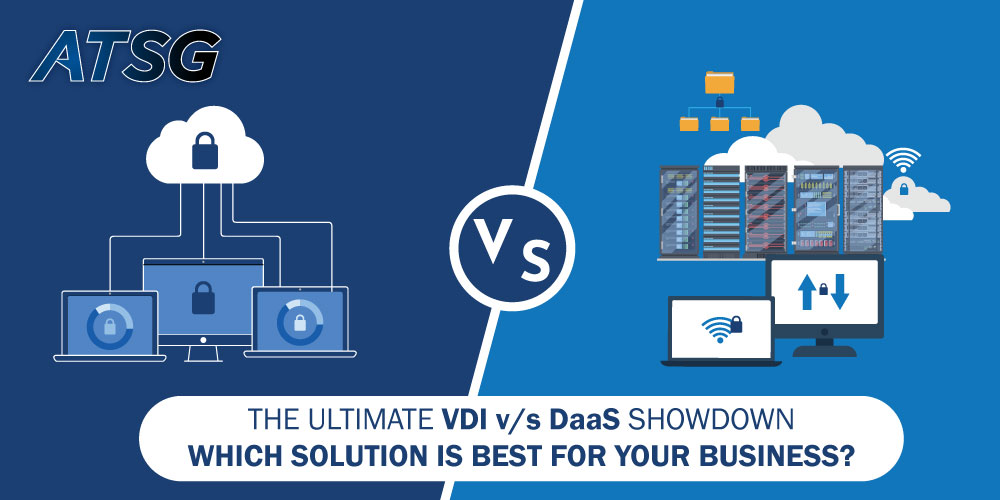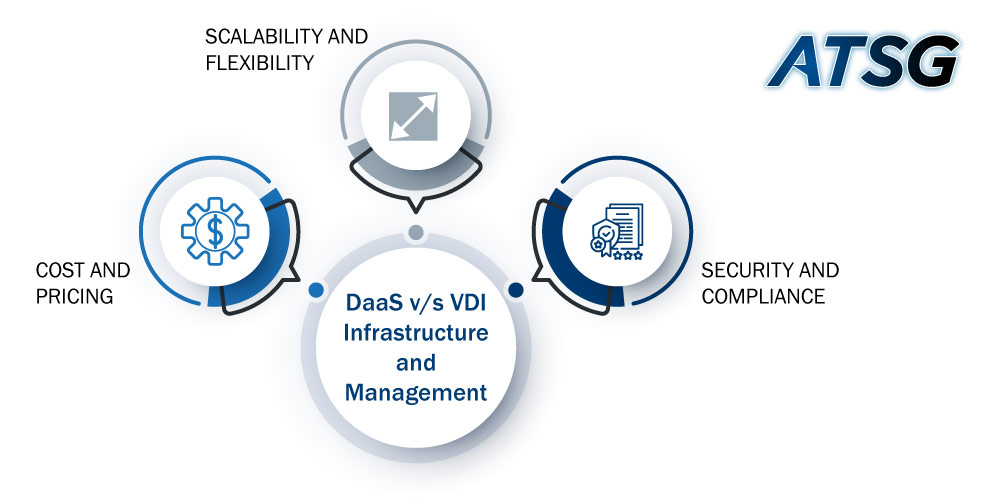The amount of flexibility and work-life-balance that hybrid workers enjoy these days was something “unheard-of”, just a few decades ago. Today, a hybrid worker’s schedule can vary greatly from one day to another. They may have virtual meetings with clients in different time zones, collaborate with colleagues across the globe on a project, or even work from a coffee shop down the street. Regardless of location, it is important that hybrid workforces have seamless and secure access to their corporate workspaces through their laptops, and a steady internet connection.
With this shift towards hybrid work, Desktop Virtualization technologies have become more strategic to business success. But have you ever wondered on the difference between Desktop as a Service (DaaS) and Virtual Desktop Infrastructure (VDI)? And, which desktop virtualization technology is right for your enterprise?

Keep reading to find out, and learn more about DaaS and VDI, along with a detailed comparative analysis of both these technologies.
What is Virtual Desktop Infrastructure (VDI)?
VDI technology allows desktop Operating Systems (OS) to be hosted either on-premise, or in exclusively shared co-locations. With VDI, users can remotely access and interact with their virtual desktops and applications using peripheral devices. Plus, VDI makes it possible to use lighter and more portable devices, without sacrificing computing power.
But that is not all – VDI is self-managed, which means your IT department is responsible for maintaining and upgrading the hardware, software and overall upkeep of the system. VDI runs a complete desktop OS, applications and data on a Virtual Machine (VM) that can be accessed remotely by multiple users. These VMs are hosted on in-house servers, in a secure data center, and end-users connect to these virtual desktops using remote display protocols.
VDI Common Use Cases
VDI is best for enterprises in regulated industries with strict data-privacy policies or graphics-intensive workloads that are integral to the business. Steady-growth businesses with the resources to support an expensive VDI can benefit from long-term savings though.
The main advantages of VDI are centralized management, and the ability to provision and de-provision virtual desktops quickly. However, VDI can be quite expensive to implement and maintain, and it requires specialized IT skills and infrastructure to manage.
What is DaaS?
Now, let’s move towards how DaaS solutions are revolutionizing the future of work. Unlike VDI, DaaS utilizes the power of the Cloud to deliver virtual desktops from a Cloud Service Provider’s (CSP) data center(s), over the internet. This means your team can access their desktops from any device, anywhere, and at any time. The best part is that CSPs take care of everything, from the infrastructure to its periodic maintenance. This way, businesses can focus on what really matters, and that is generating value for all stakeholders.
DaaS Common Use Case
For businesses seeking to minimize the overhead costs of maintaining a physical IT infrastructure in house, Desktop as a Service (DaaS) might be the perfect solution.
- Large enterprises can use DaaS to reduce IT infrastructure complexity, while providing more flexibility and mobility to their employees.
- Medium-sized businesses can take advantage of the flexibility of DaaS as they scale up or down, as well as enhanced data security.
- Small businesses can benefit significantly from DaaS, providing employees with access to cutting edge software, without investing in expensive hardware or maintaining a large IT department.
In other words, DaaS solutions are flexible, scalable, reliable and agile, where enterprises only pay for what they actually use. Plus, businesses need not worry about the hassle and costs of setting up and maintaining their own infrastructure, on-premise.
DaaS v/s VDI – Infrastructure and Management
Now, you might be wondering how VDI is different from DaaS. Well, with VDI, you have more control and ownership over the infrastructure. It is like a do-it-yourself (DIY) version of DaaS.
To simplify further, we now dive into the actual differences between both the solutions, so that towards the end, you can make an informed decision about which solution to choose for your enterprise.

1. Cost and Pricing
When it comes to costs, DaaS is a great option for businesses looking to save money. With DaaS, there are no major upfront costs (CapEx) for hardware and software. Instead, you will typically pay a subscription fee based on the resources you actually use. VDI, on the other hand, can be quite expensive to setup and manage, making it less feasible, particularly for startups.
2. Scalability and Flexibility
Furthermore, DaaS offers more flexibility and scalability than VDI. With DaaS, businesses can quickly adjust their resources to meet changing needs. Plus, DaaS providers typically offer robust Disaster Recovery (DR) and Business Continuity (BC) options, making it easier to keep operations running smoothly. VDI requires businesses to invest in, and manage their own infrastructure.
3. Security and Compliance
Both, VDI and DaaS present businesses with different options for securing their data and applications. VDI provides the benefit of internal control over data security measures, making it a favorable option for companies handling sensitive information. Interestingly, DaaS also presents a compelling option for enterprises that value the security of their data. By centralizing access to data and applications in the Cloud, the risk of lost data due to endpoint theft, loss or damage is significantly reduced via DaaS and VDI solutions alike.
Factors to Consider When Choosing DaaS or VDI
Choosing the right desktop virtualization solution for your business is a critical decision that requires careful deliberation. Here are some important factors to keep in mind, when choosing DaaS or VDI:-
- Business Size and Needs: When deciding between VDI and DaaS, the size and needs of your business are important factors to consider. While VDI may be a more viable option for larger organizations with ample financial and IT resources, DaaS can be equally suitable for enterprises of all sizes, whether small, medium or large.
- IT Resources and Expertise: VDI requires skilled IT personnel to manage the on-premise infrastructure, and ensure optimal performance. DaaS, on the other hand, is managed by a third-party CSP, which reduces the burden on in-house IT resources, and also frees up time for other critical tasks.
- Budget and Cost Analysis: When it comes to cost, VDI requires a significant up-front investment (CapEx) in hardware and infrastructure. DaaS, on the other hand, operates on a subscription-based model (OpEx), making it quite affordable and accessible for most businesses.
- Integration with Existing Systems: VDI requires integration with an enterprise’s existing infrastructure and systems, which can be challenging and time-consuming. Whereas DaaS is designed to be more flexible, and can seamlessly integrate with existing systems. DaaS solutions can also be deployed independent of an enterprise’s existing infrastructure, making the transition a lot quicker and hassle free.
Conclusion
Whether you are large corporation, a mid sized organization that is rapidly expanding, or a budding small business, choosing the right desktop virtualization technology can make a huge difference.
While Virtual Desktop Infrastructure (VDI) has its benefits, Desktop as a Service (DaaS) offers a much more cost-effective, scalable and flexible solution than VDI, which can give your business the boost it needs to reach the desired heights. So, take the time to weigh your options and choose the virtualization technology that is the “best fit” for your business. After all, when it comes to virtualization, one size definitely doesn’t fit all!
Contact ATSG for top-notch managed IT services, intelligent technology solutions and highly scalable as well as reliable Cloud Computing solutions for your enterprise.
ATSG’s DaaS solutions offer a secure and compliant platform for your business, ensuring your valuable data is protected at all times. Our team of experts uses the latest security technologies and compliance frameworks to ensure your data is safe, and meets regulatory requirements.
Contact Us today to learn more about how ATSG’s DaaS solutions can help take your business to the next level.




